Pride of Nations Q&A - First Details
Europa Universalis designer Phillippe Thibaut has turned his attention to a much smaller segment of history in this new strategy game. Get the first details here.
The Europa Universalis series has established itself as an extremely deep and far-reaching grand strategy game that lets you reenact centuries of world history by playing as any world nation with the goal of conquering the rest of the planet. However, Paradox France's next project, Pride of Nations, will take place in a much shorter time frame--namely, the Victorian era, spanning the 19th and 20th centuries, and it will introduce new concepts and gameplay, such as an overhauled diplomacy system. Game producer Phillippe Thibaut explains. 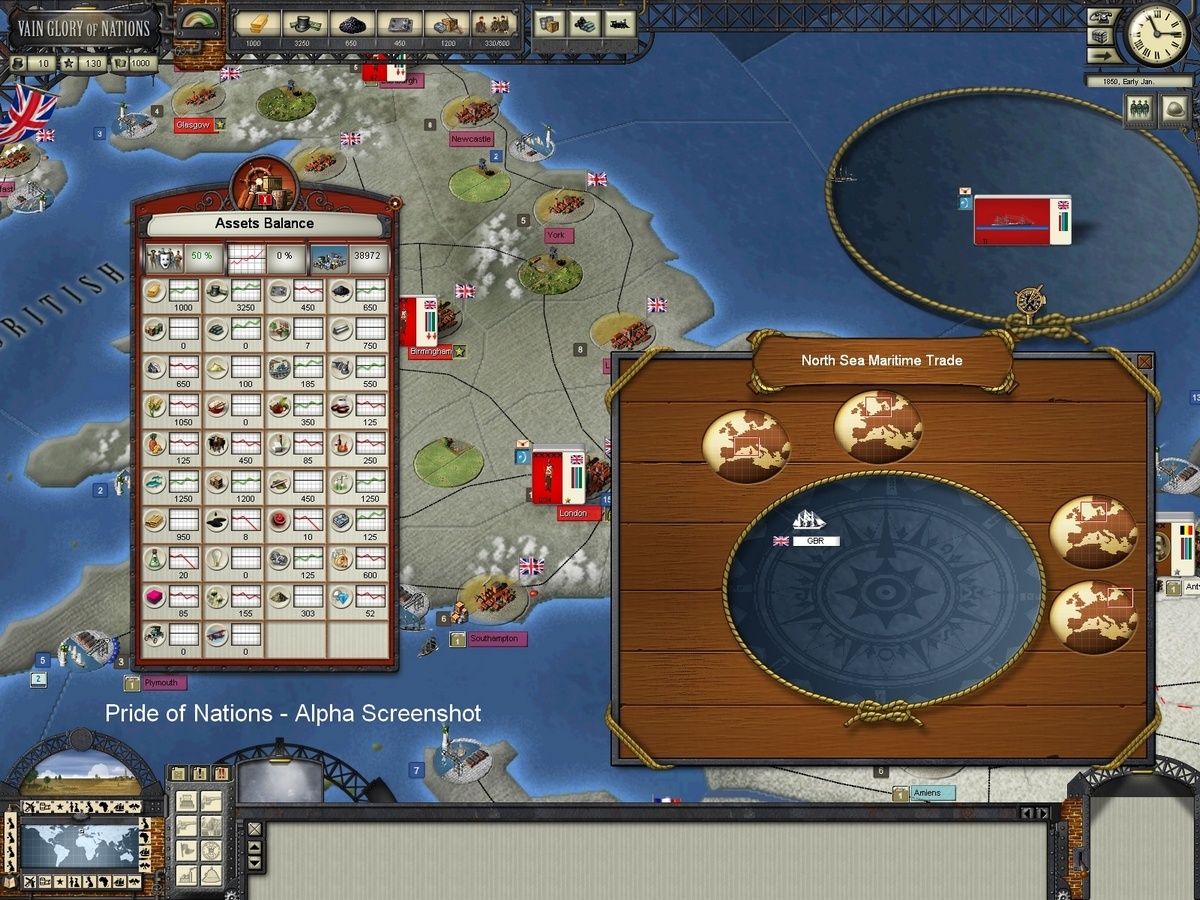
GameSpot: We understand that the core concepts behind Pride of Nations were originally planned for a tabletop board game that you had designed some years ago. Could you explain how these concepts are being translated into a computer game?
Phillippe Thibaud: Indeed, in the late '90s, I designed a board game called A Place in the Sun (from the famous Wilhelm II quote) that was in the spirit of my previous Europa Universalis board game but was never published when the board game market all but disappeared in the following years. However, the research, ideas, and feeling of excitement were still there. Some key concepts that were needed in this board game, such as historical events, force pools, specific rules (for diplomacy for instance), the distinction between private economy and state funds, all made their way into the computer version. In fact, I ended up converting each and every rule from the original board game.
This was only possible because the other game producer for Pride of Nations, Philippe Malacher, is also a very gifted developer and overall computer wizard with great design ideas (and he's also a good board game player and strategy player). We discussed all the rules and found the best way to adapt them into an engine working with a simultaneous turn resolution--the famous AGE engine. We spent almost five years building that engine brick by brick, creating in the meantime several historical games with it (like American Civil War or the more recent Rise of Prussia). Each game was like a sort of stepping stone to us, validating new concepts. In the end, our aim was to adapt each rule of the initial design, and by 2008, it had reached a state where we could confidently envision the next steps of PON production (graphics, database, testing).
GS: Pride of Nations takes place during a much shorter time frame than we're used to from the Europa Universalis series--in this case, the mid-1800s through 1920. Why the smaller-scale change in focus? What does this specific time period have to offer?
PT: Yes, the time period is smaller (70 years), but it is in fact quite consistent and homogeneous. This Victorian time period starts after the European Revolutions of 1848, with world powers ready to conquer the world, and ends by 1920 or slightly earlier (1914 or so), depending on whether peace has been maintained with a "great powers" balanced leadership or if a world war has erupted. This rather constricted time span offers common ground for all nations involved, including similar stories of industrial revolution, railroad and colonial expansion, national states unification, and a diplomatic atmosphere where dignitaries offer steel hands in velvet gloves and speak with silken tongues. However, the game also spans nearly 1,700 simultaneous turn-based sessions, which is very long indeed. 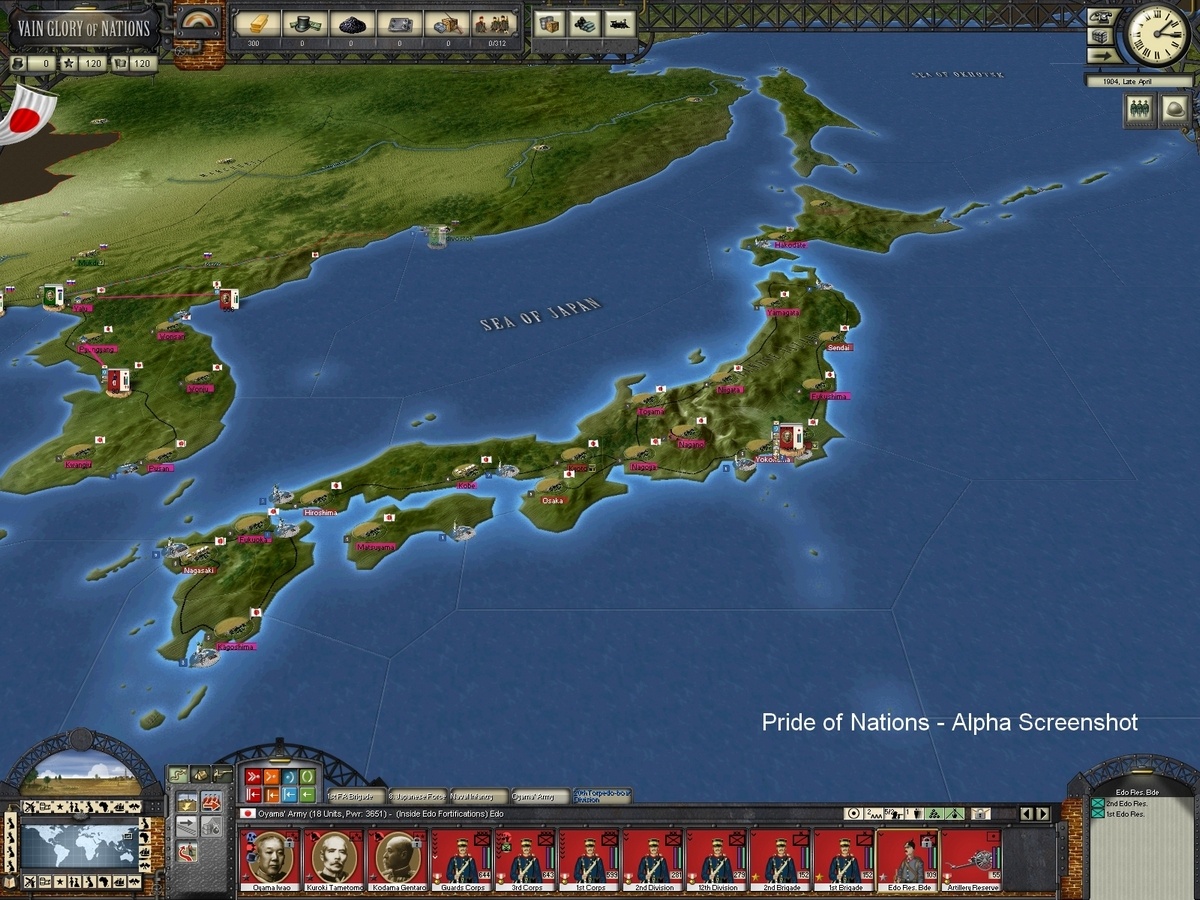
GS: We understand that the goal of the game is to attain the status of "great power." Just how would a country in Pride of Nations go about achieving that goal?
PT: This game is indeed all about obtaining the most envied status of great power (the "Place Under the Sun" position) and achieving the first rank among your other seven equals in the game. To do so, you must earn prestige. It comes in the form of economic performance, military might, diplomatic aura, historical events opportunities, sound colonial development, technological progress, social advances, balance at home, and overall world power. We also have custom national missions (such as becoming the first nation to build the Suez Canal) for each power, which, if conquered, earn you a hefty amount of prestige. In other words, there are dozens of ways other than warfare to acquire prestige, and managing all various aspects of your nation gives you many different ways to try to take the lead, so you'll never really be resting on your laurels.
GS: Could you give us an overview of what kind of options will be available to warmongers in Pride of Nations? How will war be waged in the game? By land? By sea? By cavalry? By cannon? 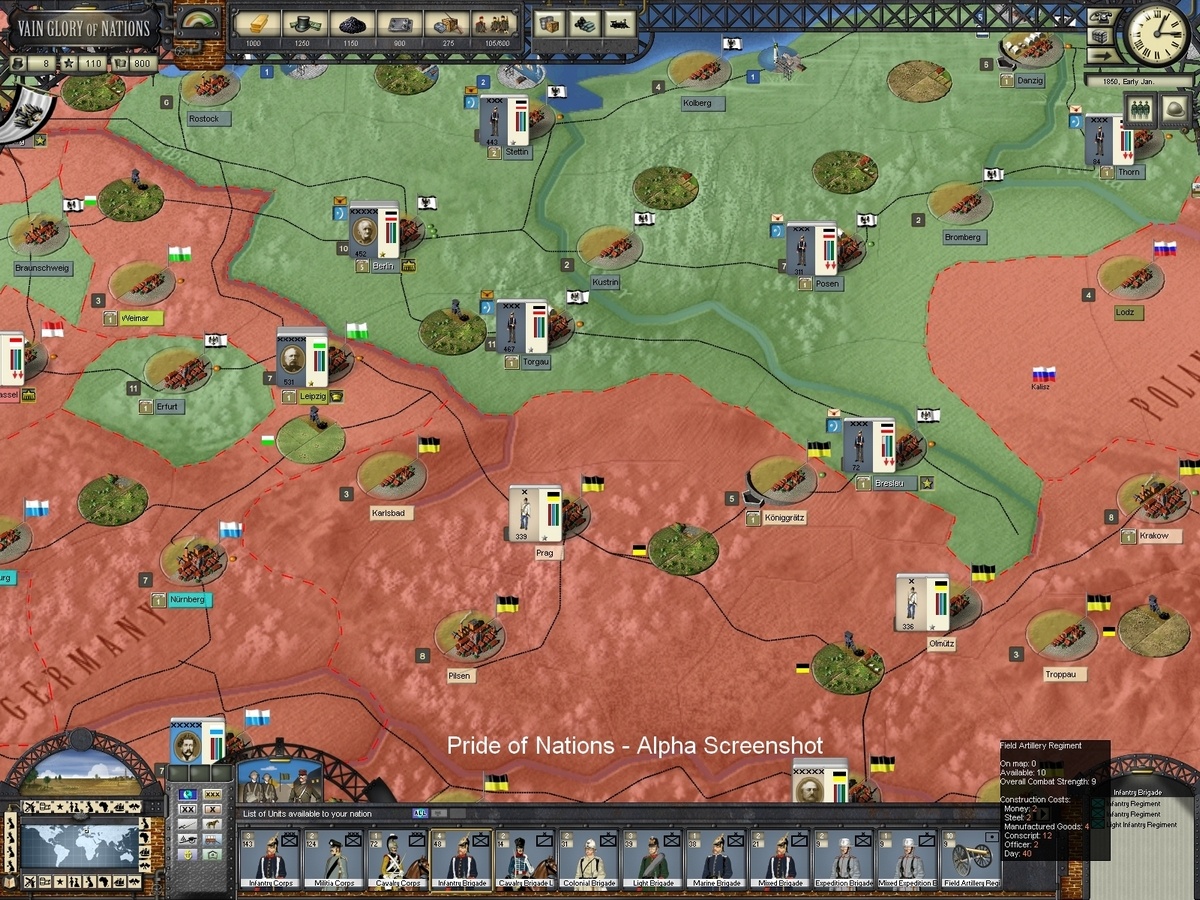
PT: Pride of Nations uses the AGE engine, which started almost exclusively as a warfare simulator at the operational and strategic levels. This part of the engine is battle hardened, if I may say so, because it has already been a part of five successful games, and even though it has proved itself successful, we are always striving to improve it by adding new features.
In PON, you have a plethora of units, both on land and at sea. There are regiments of various types (regular, militia, reserves, colonial, and special troops) and gender (infantry, artillery, cavalry), and ships of varying types, sizes, and purposes. All of them evolve over time, with technology (new weapons), training, and battle experience. There are also thousands of leaders in the game, all rated for strategic initiative, offense, defense, and, most importantly, abilities (the game has more than 500 of these). The command structure plays a crucial role in organizing armies and fleets, as well as the designation of your commander in chief, whose abilities and powers (good or bad) are somewhat transferred in part to his subordinates, both for armies and fleets.
Also, the range of your fleets will be realistically critical if you want to wage war overseas. Acquiring key coaling stations, harbors, and bases (via conquest or diplomatic agreement and with a range that evolves with technological progress) is essential to redeploy and transport your forces. For instance, there's no way for Germany to assault China in 1850!
Battles are resolved during the interphase between turns, and lots of factors are taken into account, such as weather, terrain, supply, cohesion, and fatigue of the troops…most of which you have already seen in our previous games. In the end period of PON, you'll be able to play with shell depots, gas warfare, and others novelties of the era.
GS: The game will have a unique new diplomacy system built around something called the crisis generator. Tell us about how diplomacy will work and how this feature will make things more interesting.
PT: Well, you'll find indeed all usual diplomatic treaties and options for a grand historical strategy game, like there was in EU. It works simply around some key Victorian concepts: gentlemen's agreements and casus belli (CB). Treaties are clear, simple, and not too varied, as in that age. No war is allowed versus civilized powers without a CB. This makes the flow of the game quite different from EU, for instance. CB is provided by events; some geographical, religious, or ethnical constraints (like a foreign nation oppressing lands with your national ethnics); or by results of previous conflicts.
Along with the aforementioned elements of diplomacy is our own unique invention, the crisis generator, which dynamically simulates the various diplomatic crises that erupted during this era by calculating potential conflicts (based on ethnicity, power projection, difference of prestige, colonial rivalries, events, and even stupid and random private incidents). When a crisis occurs, a special routine opens, which looks a lot like a game of poker, with a unique gameplay based on gambling and bargaining, where the currency spent is your nation's prestige and the results are varying degrees of agreements, humiliations, or possibly outright warfare. 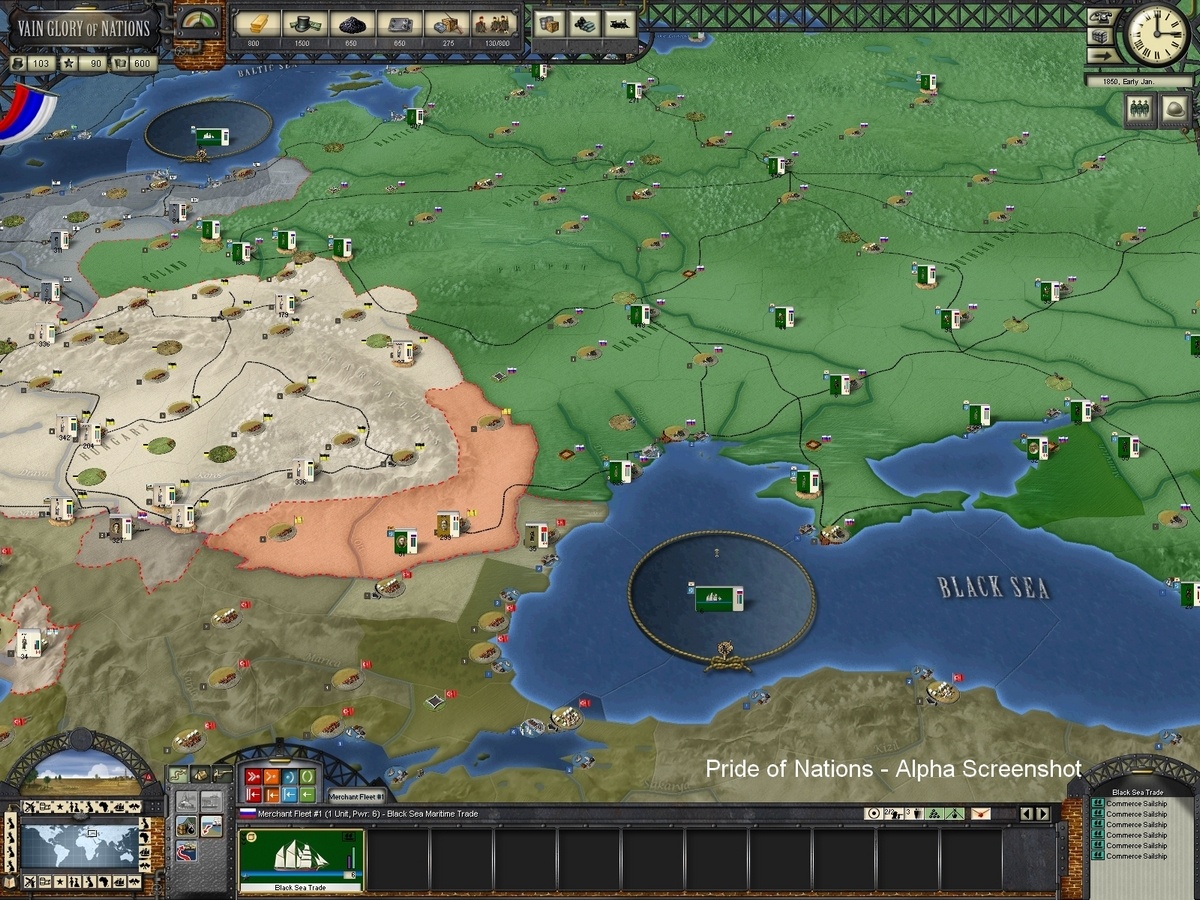
GS: We also understand that colonization will be a big part of the game. Could you explain how this system works? While the benefits of colonization--holding a larger land mass, gaining new resources that weren't available in your original home territories, and so on--seem obvious, what are some of the trade-offs for attempting to be an imperialist superpower?
PT: The colonial game in Pride of Nations is certainly the most detailed ever done in a PC game so far. Without going into too many details, it works around the concept of colonial penetration (CP) rating and spheres of influence (SOI). The former deals with actions you can take in any given colonial territory (called a colony hereafter), each of which grants you a certain amount of CP. There's a great variety of different actions you can take (more than 30), including exploration and prospecting parties, military expeditions, constructing outposts of various sizes, naval demonstrations, negotiations with the natives, infrastructure (in the form of roads, telegraphs, and dispensaries), trade development, concessions, and religious missions, among others. All powers can compete for CP in a colony until one of them gets enough to move to the next step: installing exclusive protectorates and formally colonizing (or even establishing dominions and statehood status in territories with the population of your nationality). The goal is to get a monopoly and then exclusivity because colonies will then add to your commercial network and provide you with exclusive supplies of materials and goods the home nation needs. They'll also be export sales markets for your industrial production. 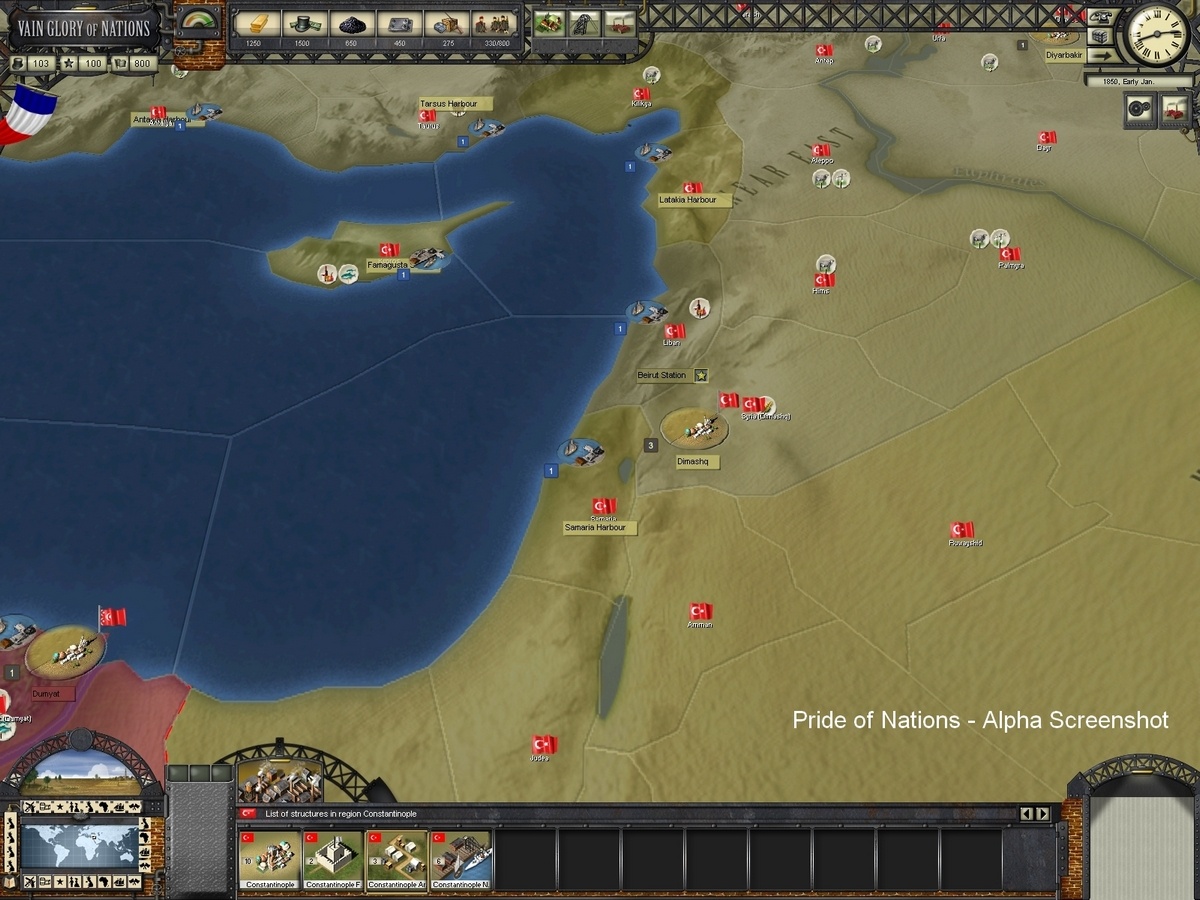
With a slight adjustment, the system works well to represent the US western frontier (the Far West) or the Russian colonization of Siberia. But you can't colonize wildly and aimlessly. First, you need commercial fleets to link colonies with the home country. But more importantly, you need to see if your SOI is good (positive) or bad (negative) in a given colony because this is how it generates prestige to win the game. You can colonize almost any territory if you can reach it and have the assets to do so, but if you choose a colony with a negative SOI, you initially lose prestige and then you may create casus belli with other powers (which may have a positive SOI in the same territory), thereby adding insult to injury.
The various SOI are more or less given at the start, but they dynamically change during the game with your global power, the historical events, and also the diplomatic actions (as SOI is a negotiation and crisis agenda item).
GS: We understand that in addition to the grand campaign, the game will have a number of one-off scenario maps. Could you give us some detail on these?
PT: Most strategy games these days usually have one grand campaign scenario to play, and that's about it. We also realized that our own grand campaign is 1,680 turns to play, which is a considerable amount of time for players to complete a game. Being aware that quite a lot of players do not have that amount of time at their disposal and could feel frustrated if they can't get into the game for a quick, interesting, and challenging discovery of the product, we're offering battle scenarios.
Our battle scenarios will be much shorter to play. At the moment, our current working selection for release is, in chronological order, the Sepoy Rebellion of 1857, the "Risorgimento" Austro-Italian war of 1859, the American Civil War (from 1862 onward), the Franco-Prussian War of 1870-1871, and the Russo-Japanese War of 1904-1905, all of which are already complete. Additional scenarios to be considered for the future include the Russo-Turkish War of 1877, the Second Boer War of 1899, the Nile Campaigns of 1885-1898, and the Spanish-American War of 1898.
We're also working on a monster battle scenario on the Guns of August, specifically, World War I circa 1914-1918. This scenario will probably offer a challenge equivalent to the game's grand campaign. The fate of this particular mission is undecided at the moment because there is intense debate within the team to see if we should make this one a short scenario that takes place during the war's first months (which would be easier to play) or if we should try to re-create the whole conflict (which will be much harder to balance).
GS: Finally, is there anything else you'd like to add about the game?
PT: I wish there were more studios around the world creating games like this one. If there were, we'd not only have more of this sort of game to choose from, but we'd also have more opportunities to meet new people from different countries and cultures. It would also be good for the industry at large, as I feel the more actors there are in this field, the better the quality of goods--the old liberal concept of market competition, in other words! But my main wish today is to continue developing future strategy games with the scope and ambition of Pride of Nations.
GS: Thank you.
Got a news tip or want to contact us directly? Email news@gamespot.com
Join the conversation